Sudan’s Census Results Complete and Accepted? Not So Fast, Says the South
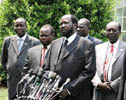
Sudan’s national census is complete, but anyone attempting to “check the box” on the daunting list of “to-be-implemented” provisions of the North-South Comprehensive Peace Agreement, or CPA, should hold off. Several weeks ago, the Sudanese government in Khartoum announced the preliminary results of the census, claiming that Sudan’s population is just over 39 million people, with Khartoum state being the most populated territory. Following this announcement, officials from the government of southern Sudan expressed their skepticism about the results, with the head of the southern Sudan census commission, Isaiah Chol, saying that “The census is political. Everything is politicized in ...
Ostriches and Warlords: Bosco Ntaganda, the Congolese Army, and the U.N.
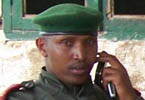
Reports on the wires this morning that Congolese general and wanted warlord Bosco Ntaganda is playing a key role in the ongoing offensive by the Congolese army, or FARDC, against the Rwandan Hutu rebel militia known as the FDLR, in eastern Congo. It is more disappointing than surprising that the Congolese army would grant Ntaganda a lead role in this mission; he was involved in the joint Congo-Rwanda offensive against the FDLR earlier this year, and the Congolese army is not known for their sterling human rights record or penchant for promoting the norms of international justice and accountability. However, ...
Quotes of the Week

Speaking last week at a panel discussion hosted by the Nobel Women’s Initiative in Washington, D.C., Nobel laureate Wangari Maathai discussed prospects for peace in Sudan and had these wise words on the future of a credible peace process in Darfur and throughout the country: It is vital that any and all peace talks include the women of Sudan, who are already building a path to peace through their efforts to create dialogue and a consultation process…When women are not part of the peace process, their access to justice, reparations and the full range of their rights is jeopardized. Also ...
Bashir on Sixth Post-Warrant Visit
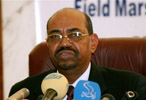
Sudanese President Omar al-Bashir touched down in Addis Ababa, Ethiopia yesterday and was greeted warmly at the airport by Ethiopian President Meles Zenawi, a large Ethiopian crowd, and a number of African ambassadors. President Meles has planned several public events to honor President Bashir, and the two leaders plan to discuss a variety of political, security, and economic issues during Bashir’s two-day state visit. At first glance, or to a casual observer, the above paragraph seems rather ordinary; presidents travel to meet fellow leaders all the time and are welcomed with receptions held in their honor. If they are particularly ...
Sri Lanka and R2P
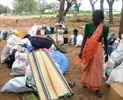
A very thoughtful piece in the Washington Post today by James Traub on the situation in Sri Lanka. A key quote: When we think of mass atrocities, we think of regimes -- or their proxies -- massacring defenseless citizens, as in Rwanda or Darfur. The situation in Sri Lanka is more complicated, morally and legally: This is a situation of armed conflict in which both parties are acting in ways that pose a grave risk to innocent civilians. The party that is perhaps more culpable -- the rebels -- answers to no one. And the Sri Lankan government has been ...
More than “Just Semantics”: Continuing the Conversation on Moyo
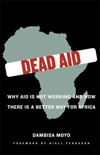
I wanted to share a recent conversation I had with a friend who read a post I wrote about Dambisa Moyo’s recent lecture at the Cato Institute in Washington and more broadly about her book Dead Aid: Why Aid is Not Working and How There is a Better Way for Africa. My friend took issue with the semantics of the parting words in my post: …I think Moyo is right in demanding that when any international actor—from celebrities and aid organizations to governments and advocacy groups—chooses to call attention to an issue on the African continent, they do so by ...
“Open Secrets” in Uganda
Human Rights Watch released a report last week condemning the practices of Uganda’s “Joint Anti-terrorism Task Force,” or JATT, a force operated by the Ugandan military’s intelligence branch. The JATT runs Kololo, a notorious illegal detention facility that HRW called an “open secret” in Uganda. The report describes many of the illegal aspects of the detention facility, including torture and enforced disappearances of people that the government suspects of “terrorist activities.” The report notes: In recent years, the most serious human rights violations in Uganda have taken place in the long northern war between the rebel Lord's Resistance Army (LRA) ...
Amid New Developments, Insecurity Simmers on in Eastern Congo
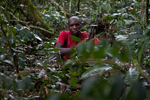
Foreign Policy recently published an excellent photo slideshow by journalist Michael Kavanagh titled "Portraits of Insecurity" which hammers home the point that "eastern Congo's future is still uncertain." Kavanagh’s photos show why Congolese people in North Kivu province have good reason to remain wary of the recent developments which have been heralded by some as positive steps toward peace in the East. But as Enough’s Goma-based researcher Rebecca Feeley recently noted on our blog: For the war-weary Congolese people of North Kivu province..., the shifted—and still shifting—alliances of eastern Congo’s rebel groups may be a cause for more fear and ...
Escalation (?) in Somalia
A thoughtful post from Elizabeth Dickinson on Foreign Policy’s Passport blog highlights the alarming reports this morning that the U.S. military is “considering attacks on pirate bases on land” and asks: Does the United States know what they're getting into? Piracy experts have long suggested that the root of the problem is indeed on land. But air strikes on Somali bases would be dangerously close to a U.S. military operation in Somalia -- the kind that the country has avoided since Blackhawk down in 1994. Let's think hypothetically about what might happen if strikes go ahead. U.S. onland intervention will ...

